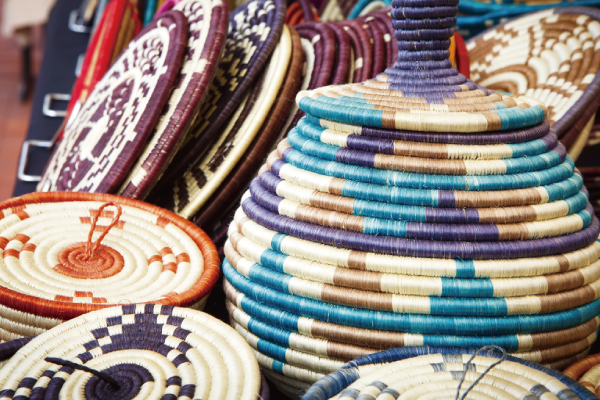
American Halle Butvin traveled to Uganda in 2006 on a study trip. She went there to learn about how young people could help build peace in the country after a long period of war. While she was there, however, she also saw how important new businesses could be to the process. Butvin visited traditional markets and thought about how she could help the artisans who designed and made crafts to sell there. She wanted to help connect them to people in the United States so they could sell more products, earn more money, and improve their quality of life. She also wanted to help Ugandan women. In 2007 Butvin met the woman who would become her trainer. That was the beginning of the One Mango Tree company. The company's purpose was to work with women artisans in Uganda creating bags, scarves, clothes, and jewelry to sell worldwide. The local artisans were trained and connected to markets. These women were not the only people the company helped; their children were also offered scholarships. One Mango Tree was a unique idea when it first started out. Since that time, however, many other companies have followed Halle Butvin's lead. Working with local artisans in poor and troubled regions, these "ethical fashion" brands connect people in many ways. The women who make the clothes can sell their products for more money than they would receive otherwise. They can also learn how to become their own bosses through business training programs. And the people who buy their products can wear them proudly, knowing that their purchases have had a positive effect on someone's life.
American Halle Butvin traveled to Uganda in 2006 on a study trip. She went there to learn about how young people could help build peace in the country after a long period of war. While she was there, however, she also saw how important new businesses could be to the process. Butvin visited traditional markets and thought about how she could help the artisans who designed and made crafts to sell there. She wanted to help connect them to people in the United States so they could sell more products, earn more money, and improve their quality of life. She also wanted to help Ugandan women. In 2007 Butvin met the woman who would become her trainer. That was the beginning of the One Mango Tree company. The company's purpose was to work with women artisans in Uganda creating bags, scarves, clothes, and jewelry to sell worldwide. The local artisans were trained and connected to markets. These women were not the only people the company helped; their children were also offered scholarships. One Mango Tree was a unique idea when it first started out. Since that time, however, many other companies have followed Halle Butvin's lead. Working with local artisans in poor and troubled regions, these "ethical fashion" brands connect people in many ways. The women who make the clothes can sell their products for more money than they would receive otherwise. They can also learn how to become their own bosses through business training programs. And the people who buy their products can wear them proudly, knowing that their purchases have had a positive effect on someone's life. 來自美國的哈莉• 波特芬,於2006年參加學術旅遊而前往烏干達。她的目的在於了解年輕人該如何幫助剛結束長期鬥爭的烏干達重建和平。不過,她在烏干達亦看見了新型態商機對重建和平的重要性。 波特芬造訪各傳統市集,思考著該如何協助在市集裡出售手工藝品的藝匠。她希望幫助此族群建立美國通路,以便出售更多產品、賺取更多利潤,進而改善他們的生活品質。她也很想向烏干達婦女伸出援手。2007 年,波特芬認識了一名當地女性,並請她擔任職訓師。這就是「一棵芒果樹」公司的草創故事。 公司的營運方向主要是與烏干達的女性工匠合作,設計出各式各樣的包包、圍巾、服飾和首飾,並賣到世界各地。公司還會訓練工匠,幫她們打通市場。而且,並不是只有婦女受惠,她們的孩子也能得到公司提供的獎學金。 「一棵芒果樹」的創立之初,可說是獨具一格的經營理念。後來有許多公司見賢思齊,開始與貧困地區的當地工匠配合。此類所謂的「道德時尚」品牌,會以各種方式來廣結善緣。旗下自製服飾的女性手藝人,透過此合作方式,出售產品時的利潤更高,還能藉由商業訓練課程,學會自己當老闆。而購買與穿搭此類產品的消費者,更能感到自豪,因為自己購買的物品能對他人的生活帶來正面影響。 |